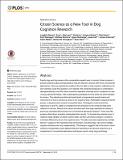Files in this item
Citizen science as a new tool in dog cognition research
Item metadata
| dc.contributor.author | Stewart, Laughlin | |
| dc.contributor.author | MacLean, Evan L. | |
| dc.contributor.author | Ivy, David | |
| dc.contributor.author | Woods, Vanessa | |
| dc.contributor.author | Cohen, Eliot | |
| dc.contributor.author | Rodriguez, Kerri | |
| dc.contributor.author | McIntyre, Matthew | |
| dc.contributor.author | Mukherjee, Sayan | |
| dc.contributor.author | Call, Josep | |
| dc.contributor.author | Kaminski, Juliane | |
| dc.contributor.author | Miklosi, Adam | |
| dc.contributor.author | Wrangham, Richard W. | |
| dc.contributor.author | Hare, Brian | |
| dc.date.accessioned | 2015-10-16T13:40:01Z | |
| dc.date.available | 2015-10-16T13:40:01Z | |
| dc.date.issued | 2015-09-16 | |
| dc.identifier | 224154571 | |
| dc.identifier | 490529af-52fc-404e-a315-15df332ffcf4 | |
| dc.identifier | 000361610200006 | |
| dc.identifier | 84945568316 | |
| dc.identifier | 000361610200006 | |
| dc.identifier.citation | Stewart , L , MacLean , E L , Ivy , D , Woods , V , Cohen , E , Rodriguez , K , McIntyre , M , Mukherjee , S , Call , J , Kaminski , J , Miklosi , A , Wrangham , R W & Hare , B 2015 , ' Citizen science as a new tool in dog cognition research ' , PLoS ONE , vol. 10 , no. 9 , e0135176 . https://doi.org/10.1371/journal.pone.0135176 | en |
| dc.identifier.issn | 1932-6203 | |
| dc.identifier.other | ORCID: /0000-0002-8597-8336/work/37477926 | |
| dc.identifier.uri | https://hdl.handle.net/10023/7663 | |
| dc.description | The work of Á.M. was supported by the Hungarian Academy of Sciences (MTA 01 031). | en |
| dc.description.abstract | Family dogs and dog owners offer a potentially powerful way to conduct citizen science to answer questions about animal behavior that are difficult to answer with more conventional approaches. Here we evaluate the quality of the first data on dog cognition collected by citizen scientists using the Dognition. com website. We conducted analyses to understand if data generated by over 500 citizen scientists replicates internally and in comparison to previously published findings. Half of participants participated for free while the other half paid for access. The website provided each participant a temperament questionnaire and instructions on how to conduct a series of ten cognitive tests. Participation required internet access, a dog and some common household items. Participants could record their responses on any PC, tablet or smartphone from anywhere in the world and data were retained on servers. Results from citizen scientists and their dogs replicated a number of previously described phenomena from conventional lab-based research. There was little evidence that citizen scientists manipulated their results. To illustrate the potential uses of relatively large samples of citizen science data, we then used factor analysis to examine individual differences across the cognitive tasks. The data were best explained by multiple factors in support of the hypothesis that nonhumans, including dogs, can evolve multiple cognitive domains that vary independently. This analysis suggests that in the future, citizen scientists will generate useful datasets that test hypotheses and answer questions as a complement to conventional laboratory techniques used to study dog psychology. | |
| dc.format.extent | 16 | |
| dc.format.extent | 1604777 | |
| dc.language.iso | eng | |
| dc.relation.ispartof | PLoS ONE | en |
| dc.subject | Canis-familiaris | en |
| dc.subject | Domestic dogs | en |
| dc.subject | Pointing gestures | en |
| dc.subject | Social dog | en |
| dc.subject | Wolves | en |
| dc.subject | Traits | en |
| dc.subject | Humans | en |
| dc.subject | Comprehension | en |
| dc.subject | Validation | en |
| dc.subject | Hypothesis | en |
| dc.subject | BF Psychology | en |
| dc.subject | DAS | en |
| dc.subject.lcc | BF | en |
| dc.title | Citizen science as a new tool in dog cognition research | en |
| dc.type | Journal article | en |
| dc.contributor.institution | University of St Andrews. School of Psychology and Neuroscience | en |
| dc.contributor.institution | University of St Andrews. Centre for Social Learning & Cognitive Evolution | en |
| dc.identifier.doi | https://doi.org/10.1371/journal.pone.0135176 | |
| dc.description.status | Peer reviewed | en |
| dc.identifier.url | http://journals.plos.org/plosone/article?id=10.1371/journal.pone.0135176#sec008 | en |
This item appears in the following Collection(s)
Items in the St Andrews Research Repository are protected by copyright, with all rights reserved, unless otherwise indicated.

